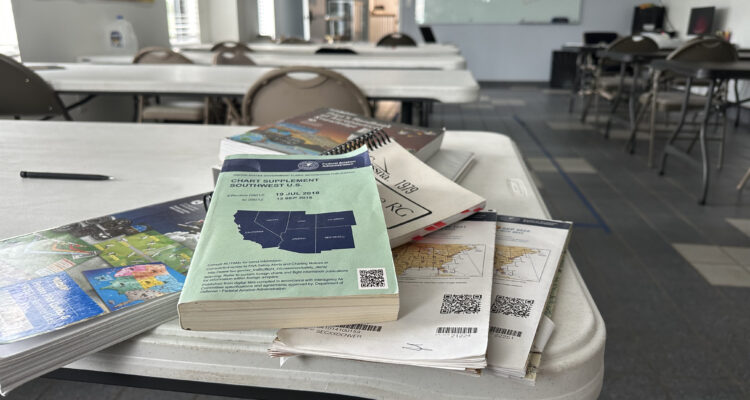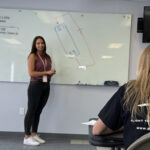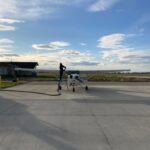How best to prepare for your introduction to flying
Learn from a professional instructor without ever leaving home. Our Private Pilot Virtual Ground School is a prerequisite to those taking our Accelerated Private Pilot Training Program and covers everything you need to know to become a Private Pilot via evening video conference for two weeks. With weekend meet-ups at the hangar and group study sessions, the course covers:
- Pilot Privileges and Responsibilities
- Aeronautical Decision Making (ADM)
- Aircraft Construction & Instruments
- Aerodynamics
- Weather & Weather Sources
- Flight Planning
- Navigation, Charts & Navigational Aids
- Federal Aviation Regulations
- and more!
One additional included in-person session at our maintenance hangar covers:
- Aircraft Systems
- Aircraft Maintenance
We strongly recommend the accompanying Sporty’s Private Pilot video course as a supplement and can provide sign-up codes over the phone. Connecting your Sporty’s account with your instructor can help your instructor assign additional review and keep track of your progress toward passing the FAA written test!
Required Materials:
- Pilot's Handbook of Aeronautical Knowledge*
- FAR/AIM*
- Plotter
- E6B Calculator
- FAA Sectional Chart
- FAA Chart Supplement
Additional Recommended Reading:
- Airplane Flying Handbook*
*Please note: Use of digital textbooks is perfectly acceptable. You may access digital copies of all FAA Documents, including these textbooks, via the FAA’s website.
Course Outline
On day one, we discuss what it takes to become a private pilot, what you can and can't do as a Private Pilot and how to adopt aviation-focused decision-making skills.
- What it takes to become a Private Pilot
- Pilot Pilot Privileges and Responsibilities
- Aeronautical Decision Making (ADM)
On day two, we'll dive deep into the parts of an aircraft, how aircraft systems function and what flight instruments do and how they work.
- Aircraft Construction
- Aircraft Systems
- Flight Instruments
Day three begins with answering the age old question, "how do airplanes fly?" The answer? Magic, of course. Magic and money, that is...
- Principles of Flight
- Aerodynamics of Flight
- Flight Controls
On day four, we pull out the map and begin deciphering the aviation-equivalent of your classic AAA roadmap—plus all of the fun additional supplements.
- Airspace Types and Function
- Sectionals & Charts
- Chart Supplements
It's Friday (usually) by the time we start surveying the airport surface, learning about lighting and pavement markings, discussing how to and how not to talk on the radio and how to ask not what ATC can do for you, but what you can do for ATC.
- Aircraft Operations
- Radio Communications Procedures
- Air Traffic Control
- Flight Following
- Lights and Airport Markings
- Runway & Taxiway Procedures
The weekend brings a party! Weather may occasionally sour the fun, but it's easy to push to another day instead. Usually beginning around lunch time and spanning the afternoon, the class tours the hangar, meets the maintenance crew and has a hands-on exploration of aircraft systems, along with several other hands-on demos. This is usually a great opportunity to meet the CFIs and other students you'll study with!
- Hangar Tour!
- In-Person CFI Meet & Greet
- Aircraft Systems Show & Tell
- Airport Ops Activities & Discussion
Day 6 Class Location
Get to know your classmates on this group-study day, where you'll break into smaller groups and spend a few hours discussing what you've learned and helping each other come up with questions and explanations. This can be a great time to quiz each other using flashcards, racing each other through practice questions and more!
- Student-led study day
- Practice testing
- Socratic discussion
It's a rainy day and you're stuck at home staring out the window identifying clouds for your CFI while you learn what makes the wind blow and why the water swirls one way or the other in the toilet bowl.
- Weather systems
- Atmospheric physics
- Icing dangers
- VMC vs IMC (plus VFR vs IFR)
- Thunderstorms & other flight hazards
- How to play the "what kind of cloud is that?" game
Learn how to get the weather—officially and unofficially—before any day you plan to fly. Students interpret weather products like they're spies during the cold war in this fun class full of "how do you spell 'fog'" in METAR-speak?
- Decoding METARs
- Decoding TAFs
- Types of AIRMETs
- Weather Briefings
Particularly important at altitude in Colorado Springs, this class helps students understand the key elements of several must-do pre-flight maths. Learn how to balance a board (and an airplane) using the WAM formula and how those crazy bush pilots manage to land an airplane in so little space.
Around this time, we encourage students to start scheduling written exams for the week after class, so they can keep moving quickly through their training!
- Weight & Balance Charts
- W&B Calculations
- Aircraft Performance
- Takeoff & Landing Distance Calculations
- Air density adjustments
Learn to go places with the help of a flight instructor on day eleven, where finding where you are is just as important as learning where to point the plane to get where you're going.
- How to get lost
- How to get un-lost
- Nav logs
- True airspeed calculations
- Wind correction angles
- Pilotage & dead reckoning
- Flight following
- Cross-country procedures
Learn about the physiological elements related to flying, the paperwork that permits you to fly and the details around what sort of documents your aircraft must have to be legal to fly.
- Required pilot documents
- Required aircraft documents
- Pilots' Operating Handbooks
- Aircraft Certificates
- Aeromedical factors
- How not to die from lack of oxygen
- Medical school (sorta, not really)
It's game-show Saturday! On warm-enough days, this class may also be done at the hangar, where instructors will gather to congratulate you on surviving the course and help answer your questions about the next stage of your flight training journey. There's usually prizes associated with being the most-prepared legal expert for this fun class full of dry material!
- Aviation law
- Aviation law
- More aviation law
- All the things you're not allowed to do
Here at The Flight School, we make saving you money a priority, so we insist you take the written exam before you proceed too far into your flight training. To this end, we organize study sessions and help you facilitate practice exams to ensure you're prepared to keep moving forward! Hopefully, you've followed our advice and scheduled your written test for the coming week so that you're ready to roll right into flight training!
- Practice written exams
- Group study sessions with your new best-friend classmates
- Instructor virtual (and/or hangar) office hours






